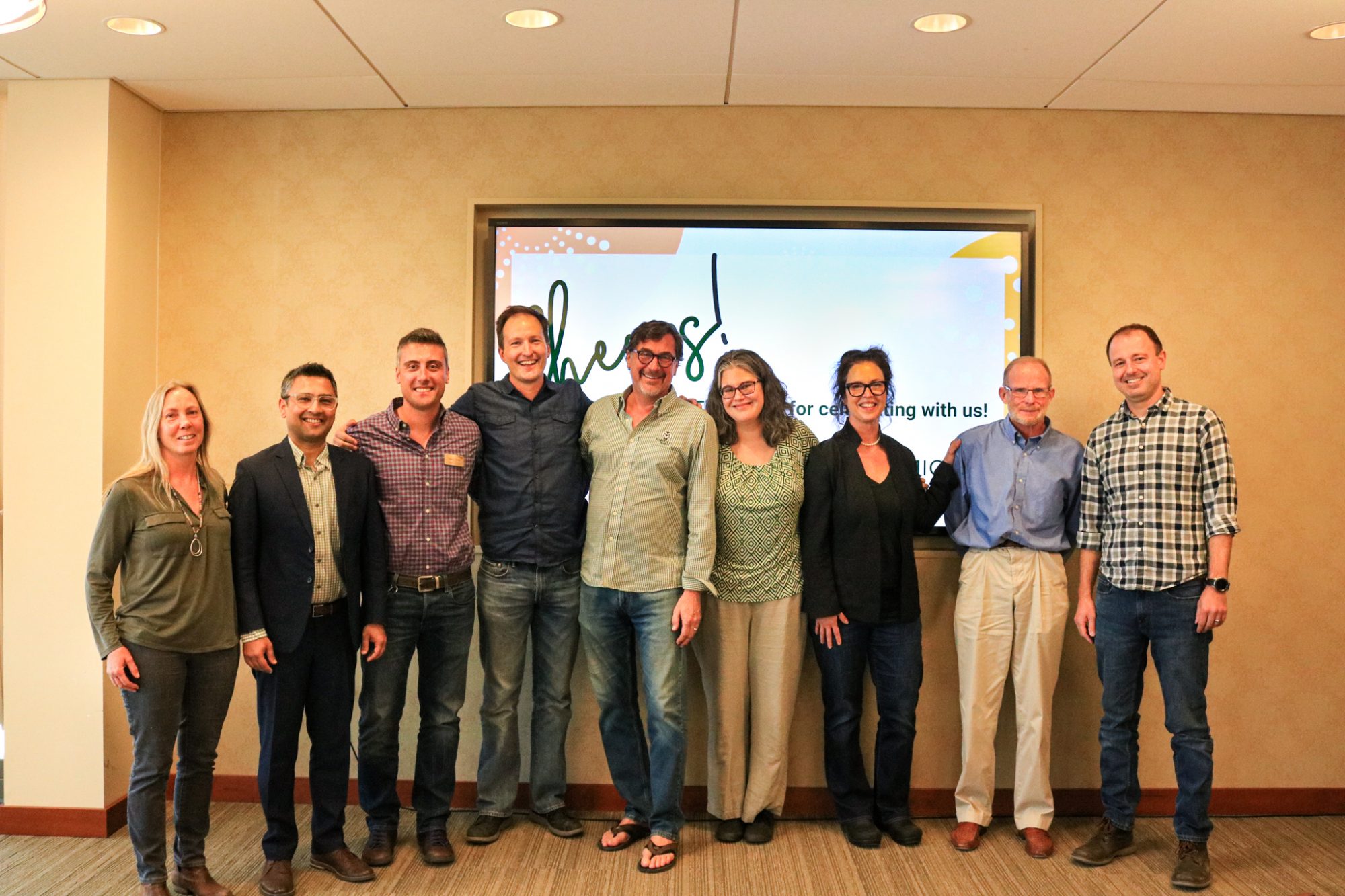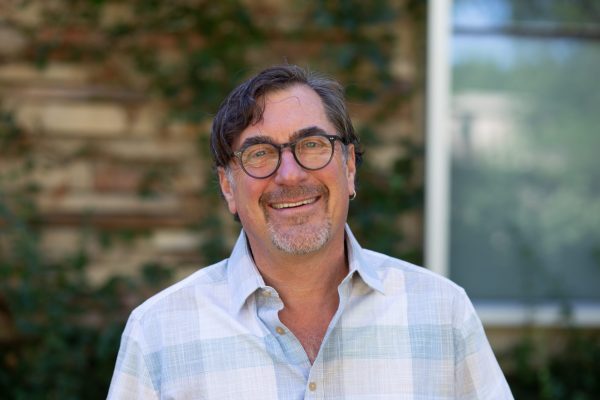
From teaching, research, and leadership to an incredible breadth of service to the community, Associate Professor Robert “Bob” Kling has been a pillar of the Department of Economics since he arrived in 1984.
“If you’re going to use one word to describe Bob, he has vision,” said Professor Harvey Cutler, who has taught alongside Bob since 1985. “Whenever I have a problem, I say to myself, ‘Hey, what would Bob do?’ because of his ability to step back and see the big picture.”
In his tenure, Bob has served as Department Chair, Graduate Program Director, and Undergraduate Program Director, serving both as an incredible mentor to students and as a respected voice among faculty. Over 38 years, he has taught hundreds of sections of microeconomics courses, advised dozens of doctoral dissertations, and led the charge to broaden CSU economics’ reach to global horizons.
“Because Bob has, again, a tremendous sense of vision, he sees all the different factions of the department. As Chair, he made sure that we integrated and worked together as a group. Even as a young associate professor, he was instrumental in creating harmony,” said Cutler.
From the early days of securing tenure to approaching retirement, Bob’s caring nature has never wavered.
“When Jo [Burgess Barbier] and I first came to our department five years ago, like everyone else, Bob made us feel welcome. However, as we settled in, it became clear that Bob’s warmth and friendliness was not only genuine but also an essential part of who he is and why he cares about people. Kindness is embedded in Bob’s soul,” said Professor Ed Barbier.
As Bob prepares to retire this month, he leaves a legacy of care, service to others, and of course, vision.
Le coeur a ses raisons
If you ask Bob why he first chose to study economics, his answer might be surprising:
“Well, when I was 17, my aspiration was to get rich. And for reasons I cannot explain, I was really motivated to spend time in France,” Bob said.
Born and raised in western New York, Bob studied at Davidson College in North Carolina partly because it offered a yearlong study abroad program at the University of Montpellier. Ironically, that year abroad is what fundamentally changed his perspective on American capitalism and reoriented his intentions to go into business.
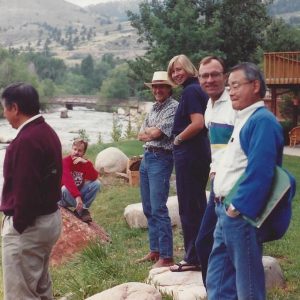
“Like many study abroad students, you come back and see your own culture differently. While I was in France, I took a course called ‘American Imperialism’ that was an economics course about imperialism from a Marxist-Leninist standpoint. For a brief period afterward, I was a Marxist, which I’m not anymore, but you know, putting yourself in other shoes and just trying on different perspectives is really good. That’s a lot of what informed my teaching philosophy the last 38 years,” Bob said.
Realizing that economics is more about maximizing social wellbeing than getting rich, Bob went into graduate studies at the University of Kansas, where he specialized in applied microeconomics and natural resource economics. Upon finishing his Ph.D., he came to Colorado State University as an assistant professor in 1984.
Like most academics, Bob’s early career years were focused on securing tenure, which he earned in 1990. His early papers focused on the economics of regulation, and he developed some of CSU’s earliest courses in environmental economics, then a relatively new subdiscipline. He also developed the department’s first graduate level math economics course (now ECON 501).
“Bob has always been one of the more observant people in the economics department. He had the vision about departmental needs and understood what he could contribute. I think that a lot of faculty members don’t have that right away, but Bob did have it right away,” said Cutler.
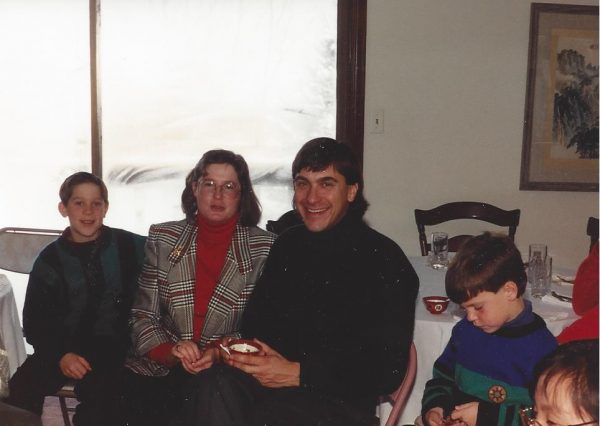
With tenure came sabbatical and the opportunity for Bob to return to France and the University of Montpellier for 10 months in 1991-92 – this time as a visiting researcher with his partner, Celeste Holder Kling, and two young children, Matthew and Alexis, in tow.
This trip would be the first of many cultural experiences Bob would enjoy with his family, setting the stage for a legacy of internationalism in the Department of Economics. In 1993, he was invited to spend time as a visiting professor at both the Technical University of Budapest in Hungary and University of Naples in Italy, teaching short courses in environmental economics and the economics of historical preservation.
Over the years, his experience in researching and teaching abroad would take him to Panama, Benin, Cote d’Ivoire, Vietnam, India, China, Greece, Morocco, Ghana, South Africa, Denmark, and beyond.
“I just had an eye out for how I could get involved in international kinds of education. Once you have your energy piqued and your eyes open, stuff comes along, and if you’re ready to jump then you get these opportunities,” said Bob.
A vision of global partnerships
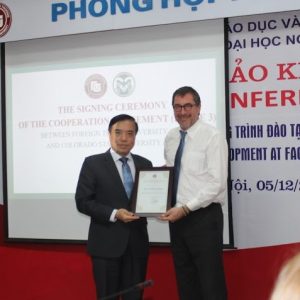
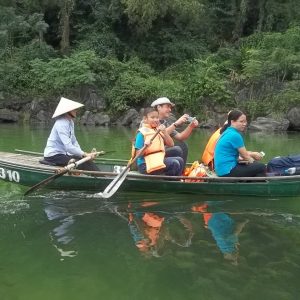
As it happened, the opportunity to contribute to international education presented itself in a major way in 2008: Vietnam’s Ministry of Education and Training was urging its universities to seek American university partners to align its undergraduate curricula with international norms. When the Foreign Trade University (FTU) in Hanoi approached CSU about partnering on economics and business courses, Bob jumped at the chance to establish the program.
“I had been in Vietnam on Semester at Sea and loved it even though I was only there for five days,” Bob recalled. “Also, at that time I was pushing 25 years at CSU and was ready for something new, so I said, ‘Sure, I’ll talk with these people.”
Bob and other members of CSU leadership met with representatives of FTU who agreed to establish the CSU-FTU Vietnam Economics Curriculum Project over just two days in April 2008. By October, Bob was in Hanoi teaching the first CSU economics class at FTU.
For Bob, teaching in Vietnam has been an opportunity to experience great food, witness drastic changes to a developing country, and meet fantastically warm and welcoming people.
“We’re really privileged when we teach at FTU because the students are very special. FTU is one of the most elite institutions in Vietnam: the students are very motivated, and they mostly have strong family expectations for education. They’re a pleasure to teach, and when I write recommendation letters, I describe the privilege of teaching at FTU as like teaching in an honors program,” said Bob.
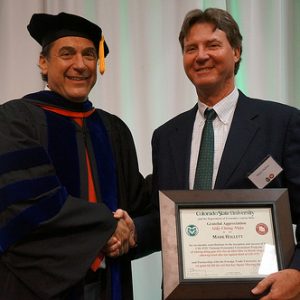
As the FTU faculty exchange evolved under Bob’s leadership, the program became a multi-dimensional partnership between the universities: More than 1,000 FTU students have taken courses from CSU faculty in Hanoi, while almost 200 FTU students have transferred to CSU to complete their CSU degree.
“A number of us in the department did not originally see how the partnership with FTU was going to work,” said Cutler. “The first time Bob went over to Vietnam by himself to teach the first class, I remember him saying there was a rainstorm and major flooding in Hanoi, so he had trouble even getting to FTU. But then the second semester, [Professor Emeriti] Charles Revier went with him and came back and said, ‘This is the best thing I’ve ever done.’ Then I immediately signed up, and now I’ve been three times.”
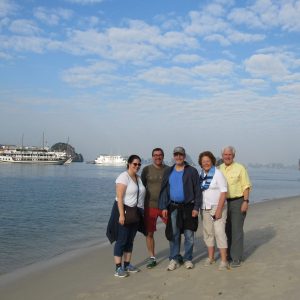
Now finishing the 13th year of the program, the economics faculty and students alike have benefited tremendously from Bob’s vision in 2008. Classes have been virtual throughout the COVID-19 pandemic, but faculty have plans to return to Hanoi in December 2022.
“Bob created such a cultural experience for the department, for all these people to go to Vietnam, interact with students, and then also for the students to come back their senior year to graduate CSU. The first cohort of 40 students had such a positive impact on our undergraduate level program here because these are top students from Vietnam, and they really pushed the American students to elevate their academic performance,” Cutler added.
Collaborating with FTU opened a world of opportunity – and within a few years, Bob would find himself seeking even broader horizons.
A call to the sea

Back in 1998, Bob spent his second sabbatical sailing with Semester at Sea as a faculty instructor. When the Institute for Shipboard Education approached CSU to become the university partner in 2016, Bob joined the transitional team. He then served as the Academic Dean on the Spring 2017 voyage and has since been in the role of Senior Academic Officer.
“Semester at Sea is a completely different study abroad experience. Usually in study abroad, students go to one country for an immersion experience. Semester at Sea is a comparative experiential international study. Whether you’re teaching economics or religion or something else, we’re teaching from a lens of cross-cultural understanding,” Bob said.
Life on the ship is alternated with stops in ports along the way where students can be briefly introduced to another culture and compare along the way. However, make no mistake: Semester at Sea is a shipboard campus, not a cruise vacation.
“The itinerary is such that it doesn’t really make sense to care whether it’s Tuesday or Sunday. A voyage is about 106 days with 58 days at sea, and 50 of them are class days, organized as ‘A’ and ‘B’ days. Faculty members each teach three courses, and students take up to 15 credits, so that takes a lot of time.”
Beyond the academic expectations, students and faculty alike also must adjust to being together in an intensive 24/7 living-learning community – with limited access to Wi-Fi.
“It’s an exciting, but exhausting job to be a faculty member,” Bob explained. “When you walk out of class, you’re likely to be in the lunch line with your students. You also see them on deck and at seminars in the evenings. You have to figure out how to give yourself some personal space and de-stress.”
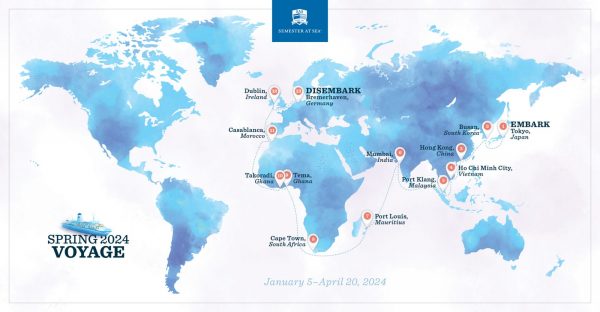
Sailing in a world still ravaged by COVI9-19 has posed its own challenges.
“When we were on the ship in 1998, there was no Internet. Now you can at least do email from the ship. I can’t imagine how we would have done the Spring 2022 voyage without close communication with the home office,” Bob said. “We had COVID cases all along the voyage, and the organization has sent staff members to take care of students quarantined in particular ports. It’s mind boggling what we were able to accomplish.”
In his retirement from the economics department, Bob will continue serving his current SAS role until August, then transition into planning the Spring 2024 voyage for which he will serve as Academic Dean. While subject to change, the planned itinerary is 107 days with stops in 13 cities across Asia, Africa, and Europe.
Over the next 18 months, Bob will select the 27 or so faculty members who will come aboard and the approximately 70 courses that will be offered to the voyage’s 550 students, who on average come from 30+ home countries to set sail on this intensive 24/7 learning experience.
“I do have some level of wanderlust, so the itinerant nature of the voyage is appealing to me, but it’s also motivational to be able to contribute importantly to such an amazing program,” Bob said. “It’s a completely unique, transformative experience that changes your view of the world.”
Big shoes left to fill
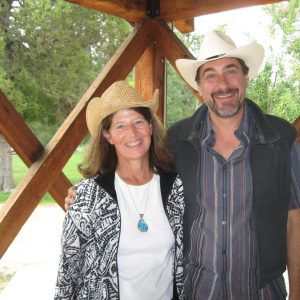
Reflecting on nearly four decades with the Department of Economics, Bob notes the opportunities he has had to explore, make connections, and keep learning.
“It’s tempting to say my greatest times at CSU were when was when I was away from CSU,” Bob laughed. “But what I mean is that CSU has given me the opportunity to be away and have new adventures. My life has been enriched through the amount of support I’ve received to pursue unusual opportunities. I’ve had freedom and support to reshape my job along the way, which is something you don’t find everywhere.”
Through Bob’s many adventures, he has still had a deep impact on faculty and department culture at home on campus.
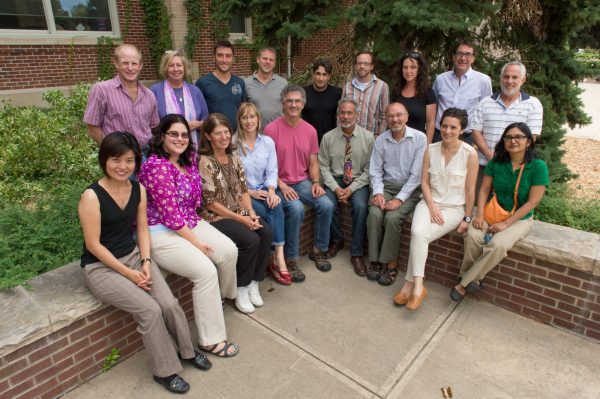
“Whenever Bob talks in a faculty meeting, I always listen because he provides insight and at least simplifies the problem we’re discussing. When Bob retires in May, we are going to lose such a huge, important resource in the functioning of our departmental meetings because we don’t have his vision now,” said Cutler.
“Bob is an extraordinary teacher. I have been sitting in his ECON 606 class all semester. He has a deep understanding of microeconomic theory, and he presents difficult concepts intuitively and, dare I say, economically. I’m thrilled to take over that course next year, and I’m also acutely aware that I have big shoes to fill,” said Associate Professor Anders Fremstad.
When it comes to teaching and maintaining relationships, the feeling is mutual.
“I’ve had fantastic departmental colleagues and experienced the joy of working with good professional partners across the university,” Bob said. “I also love and will greatly miss classroom teaching. Every time I give a lecture this semester, I think, ‘Well, that’s the last time I’m going to do this.’ I won’t miss the grading or the administrative part of a course, but I will miss the connections and conversations.”
The upside, of course, is freedom for Bob to explore places he’s never been: Tunisia, Jordan, Tanzania, Senegal, New Zealand are all priorities on his list.
“Suddenly I’m realizing, ‘Wow, I can travel in September’ because I don’t have to be here teaching. I love classroom teaching, and I will miss that, but I’m looking forward to scheduling freedom and the freedom to focus my time.”
Fortunately for those still at CSU, Bob will still be in Fort Collins when he’s not at sea – and certainly, pieces of his legacy will persist. When in doubt, take a beat from Harvey Cutler and ask yourself, “What would Bob do?”
